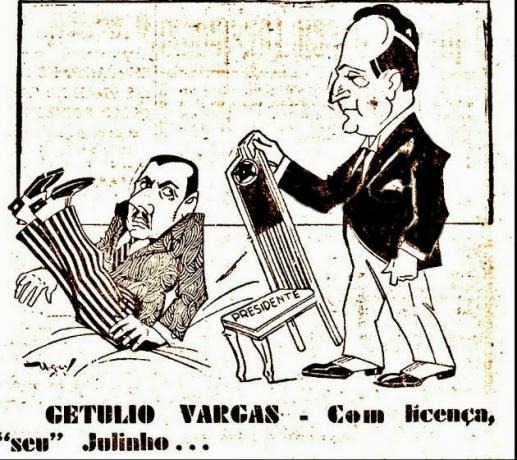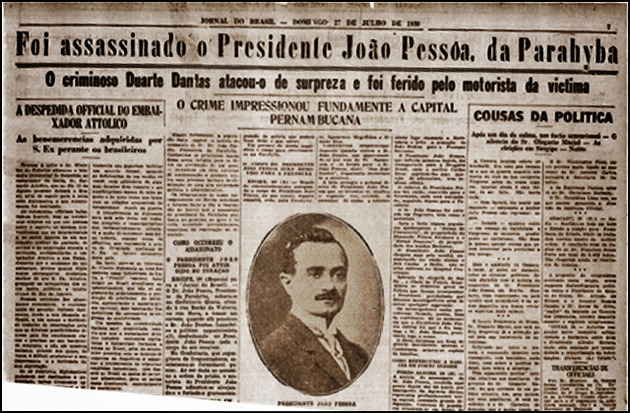THE 1930 revolution it was a coup d'état that deposed President Washington Luís on October 24, 1930.
The movement was articulated by the states of Minas Gerais, Paraíba and Rio Grande do Sul and prevented the inauguration of elected president Júlio Prestes, alleging electoral fraud.
The popular displeasure due to the 1929 economic crisis and the assassination of the politician from Paraíba, João Pessoa, also contributed to the movement's favor.
Historical context
Until 1930, politics in Brazil was conducted by the oligarchies of Minas Gerais and São Paulo, through fraudulent elections that kept the country under an agro-export economic regime.
The elites of São Paulo and Minas Gerais alternated the presidency of the Republic, electing candidates who defended their interests. This political system became known as the "coffee au lait policy" or the policy of the governors.
The model worked until other Brazilian states grew in importance and claimed more space in the Brazilian political scenario.
On the other hand, the 1929 crisis, hit the Brazilian economy, causing unemployment and financial difficulties.
The fact that Brazil is a country with a coffee monoculture made the crisis deeper, as exports of the product fell precipitously. The economic crisis contributed to the climate of popular dissatisfaction with the government of Washington Luis.
Likewise, there was the discontent of low-ranking army officers, who wanted to overthrow the oligarchies and establish a new order in Brazil.
We must remember that the lieutenants had already shown their displeasure with the Brazilian political situation through episodes such as the Copacabana Fort Revolt or in the Paulista Revolt of 1924.
1930 Presidential Elections
In early 1929, Washington Luís appointed the president of São Paulo, Julius Prestes, as his successor. This measure was supported by presidents of 17 provinces.
The appointment of Júlio Prestes broke with the alternation of powers between Minas and São Paulo, so Minas Gerais, Rio Grande do Sul and Paraíba did not support Prestes.

These provinces allied with opposition politicians and created the Liberal Alliance. Thus, the candidates of this group were the president of Rio Grande do Sul, Getulio Vargas and, for vice, the president of Paraíba, João Pessoa.
Everything seemed to indicate the victory of Julio Prestes and that's how it happened. In the elections held in March 1930, Júlio Prestes was elected with a large majority of votes (1,091,709), against Getúlio Vargas' 742,794.
In view of the results, the Liberal Alliance alleged fraud and rejected the validity of the elections.
murder of João Pessoa
Shortly thereafter, in July 1930, João Pessoa was murdered by the lawyer João Dantas (1888-1930) in Recife.
The crime is believed to have occurred for personal reasons and linked to Paraiba politics, but the death of the vice-presidential candidate has become a national issue.

Indignation takes over the country. Even without support, President Washington Luís did not intend to relinquish power.
Thus, on October 3, the military led by Getúlio Vargas, in the south, and Juarez Távora (1898-1975), in the north, converged on Rio de Janeiro.
Upon arrival in the capital, the Governing Board is formed by the three military ministers Tasso Fragoso, Mena Barreto and Isaías de Noronha.
In front of the military, Washington Luís declares that he would only leave office in prison or dead. Immediately, the Governing Board arrests him and takes him to Fort Copacabana, where he would remain until November and from there he would go into exile in Europe.
With that, Getúlio Vargas became head of the Provisional Government with wide powers, revoking the constitution of 1891 and governing by decrees. Likewise, he appointed his allies to interventores (governors) of the Brazilian provinces.
Vargas Provisional Government
Getúlio Vargas' allies expected the new president to call general elections to form a Constituent Assembly, but the matter was always postponed.
Tired of waiting, several voices began to criticize the provisional government like the communist party, the National Liberating Alliance, the paulistas, etc.
In São Paulo, the movement is growing calling for presidential elections and a Constitution. Faced with the central government's denial and increased police repression, the state of São Paulo declares war on the government in what will be known as the 1932 Revolution.
Revolution or Coup?
The 1930 Revolution was called that by its members. However, this is a coup d'etat and not a revolution.
A revolution has broad popular support, proposes and causes drastic changes when installed in power.
The coup d'état, on the other hand, is the removal of power through the violence of a politician constitutionally elected or consecrated for that position.
The events of 30 were a struggle for power between the elites, with a margin of victory for any one of them, and that would not change the Brazilian social structure in depth.
Curiosities
- Washington Luís would only return to Brazil in 1947. In turn, Julio Prestes asked for asylum at the British consulate and would return in 1934.
- Three former ministers of Getúlio Vargas and three lieutenants from 1930 reached the Presidency of the Republic: Eurico Gaspar Dutra, João Goulart and Tancredo Neves (ministers); Castelo Branco, Emílio Médici and Ernesto Geisel (military).
- Getúlio had almost 100% of the votes in Rio Grande do Sul during the election of 30.
read more:
- First Republic
- Lieutenantism
- Colonelism
- Oligarchy
- Brazil Republic
- Governors Policy
- It was Vargas
- Exercises on the Vargas Era
